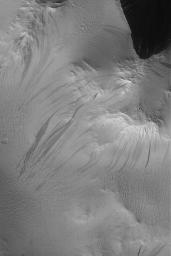Lycus Sulci Slope Streaks
Caption:
21 May 2004
This Mars Global Surveyor (MGS) Mars Orbiter Camera (MOC) image shows dark slope streaks coming off of rugged hills in the Lycus Sulci region, north of the Olympus Mons volcano. These slopes are mantled with fine, bright dust. From time to time, the dust will avalanche down a slope, forming a slope streak. The behavior of this dry, granular material can be somewhat fluid-like. New slope streaks can form at any time and, for an area the size of that shown here, may form at a rate of one per Mars year (687 Earth days). Naturally, some scientists have suggested that water plays a role in forming these streaks, but, in general, Mars is drier than the driest deserts on Earth and these streaks are contemporary features that occur in the dustiest regions of the planet. The image is located near 29.8°N, 133.4°W, and covers an area about 3 km (1.9 mi) across. The picture is illuminated by sunlight from the lower left.
Cataloging Keywords:
| Name |
Value |
Additional Values |
| Target |
Mars |
|
| System |
|
|
| Target Type |
Planet |
|
| Mission |
Mars Global Surveyor (MGS) |
|
| Instrument Host |
Mars Global Surveyor |
|
| Host Type |
Orbiter |
|
| Instrument |
Mars Orbiter Camera (MOC) |
|
| Detector |
|
|
| Extra Keywords |
Dust, Grayscale, Mountain, Volcano, Water |
| Acquisition Date |
|
| Release Date |
2004-05-21 |
| Date in Caption |
2004-05-21 |
|
| Image Credit |
NASA/JPL/Malin Space Science Systems |
| Source |
photojournal.jpl.nasa.gov/catalog/PIA05991 |
| Identifier |
PIA05991 |

